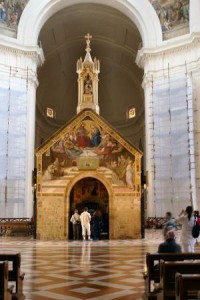 From midnight 1 August to midnight today, 2 August, you can gain the “Portinuncula” Indulgence.
From midnight 1 August to midnight today, 2 August, you can gain the “Portinuncula” Indulgence.
This indulgence seems to have been granted directly by Christ Himself in an appearance to St. Francis. The Lord them told Francis to go to Pope Honorius III, who, as Vicar of Christ, who wielded the keys, would decree it.
St. Francis, as you know, repaired three chapels. The third was popularly called the Portiuncula or the Little Portion, dedicated to St. Mary of the Angels. It is now enclosed in a sanctuary at Assisi.
The friars came to live at the Little Portion in early 1211. It became the “motherhouse” of the Franciscans. This is where St. Clare came to the friars to make her vows during the night following Palm Sunday in 1212 and where Sister Death came to Francis on 3 October 1226.
Because of the favors from God obtained at the Portiuncula, St. Francis requested the Pope to grant remission of sins to all who came there. The privilege extends beyond the Portiuncula to others churches, especially held by Franciscans, throughout the world.
A plenary indulgence is a mighty tool for works of mercy and weapon in our ongoing spiritual warfare. A plenary indulgence is the remission, through the merits of Christ and the saints, through the Church, of all temporal punishment due to sin already forgiven.
To obtain the Portiuncula plenary indulgence, a person must visit the Chapel of Our Lady of the Angels at Assisi, or a Franciscan sanctuary, or one’s parish church, with the intention of honoring Our Lady of the Angels. Then perform the work of reciting the Creed and Our Father and pray for the Pope’s designated intentions.
You should be free, at least intentionally, of attachment to venial and mortal sin, and truly repentant. Make your sacramental confession 8 days before or after. Participate at assist at Mass and receive Holy Communion 8 days before or after.
BTW… the faithful can gain a plenary indulgence on a day of the year he designates (cf. Ench. Indul. 33 1.2.d). You might choose the anniversary of your baptism or of another sacrament or name day.
My friend the great Fr. Finigan, His Hermeueticalness, has some excellent points and suggestions in his post about the Porticuncula indulgence. HERE
Also, HERE, Fr. Finigan wrote about the requirement that we not have any attachment to sin, even venial. He offers quite a hopeful view of what sounds like a difficult prospect. I warmly recommend it.
Regarding “the Pope’s intentions”, this means intentions designated by the Pope. However, some people have wondered how strict this is, or what to do it the intention is… odd. I wrote about this issue HERE. Read that post. However, here’s an excerpt:
Because we are Unreconstructed Ossified Manualists, and we love our old dependable compendia of theology with its sober and thorough analyses, we can turn to the manual by Prümmer.
Prümmer says that the intentions of the Holy Father for which we are to pray have a tradition of five basic categories which were fixed:
1. Exaltatio S. Matris Ecclesiae (Triumph/elevation/stability/growth of Holy Mother Church)
2. Extirpatio haeresum (Extirpation/rooting out of heresies),
3. Propagatio fidei (Propagation/expansion/spreading of the Faith)
4. Conversio peccatorum (Conversion of sinners),
5. Pax inter principes christianos (Peace between christian rulers).
These five categories were also listed in the older, 1917 Code of Canon Law, which is now superseded by the 1983 Code.
However, they remain good intentions all.


































Thank you for this information, Fr.
Our parish is dedicated to the Holy Angels and our pastor is a
Franciscan, so very appropriate.
Father, can somenone receive this and other such Parish-Church-related-indulgences in Seminaries and/or Religious Institutes that have a chapel which is not properly parochial?
“BTW… the faithful can gain a plenary indulgence on a day of the year he designates (cf. Ench. Indul. 33 1.2.d)”
I looked in the current Enchiridion and couldn’t find this. Would you please provide a link? Is it in the old Enchiridion?